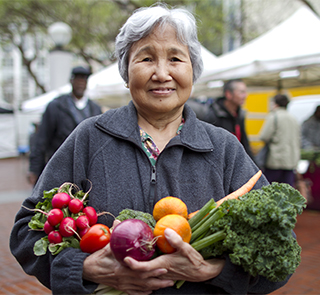 San Francisco’s Food Security Task Force estimates that 227,000 residents are at high risk of food insecurity.
San Francisco’s Food Security Task Force estimates that 227,000 residents are at high risk of food insecurity.
“Food security” is the extent to which people have access to nutritious food to support an active, healthy life, and being food insecure indicates an inability to access that food. It is a major issue in Californian communities, and UCSF is no exception – up to half of the nation’s college students are at risk of struggling with food insecurity at some point in their college career.
UCSF has established numerous resources on campus to address UCSF student nutrition and food insecurity, such as the Food Security for Students (FSFS) program. This initiative includes the Food 4 UCSF Students app, which alerts students when there is free food available after a catered event on campus, and the San Francisco-Marin Food Bank, which provides emergency assistance and weekly groceries around San Francisco. Furthermore, the Student Food Market at UCSF offers fresh produce and healthy staples every Thursday afternoon, free of charge, and Student Health and Counseling Services provides healthy recipes and meal plans for students.
In addition to campus resources for students, clinicians and staff at the Food Policy, Health, and Hunger Research Program, housed within the Center for Vulnerable Populations, hope to alleviate food insecurity and improve health outcomes for patients as well.
Dr. Hilary Seligman, a primary care physician at Zuckerberg San Francisco General Hospital and Trauma Center for over 10 years, founded Vouchers 4 Veggies - EatSF (V4V) in 2015, after realizing that many of her patients did not have the financial means to eat nutritiously even though they wanted to.
V4V is a healthy food voucher program embedded in underserved neighborhoods and communities that allows low-income individuals to purchase fruits and vegetables at partnering retailers, including large grocers, corner stores, and farmers markets. Participants of the program obtain $20 or $40 vouchers through community organizations and clinics, including the UCSF Osher Center and the Diabetes and Newcomers Clinics at ZSFG. Residents receive vouchers from people and places they are already familiar with and trust, working with their doctors, case managers, and social workers to address their healthy food needs.
Since its launch in 2015, V4V has grown from helping 250 participants to reaching 4,500 households and more than 11,000 individuals annually in developing healthy eating habits. There are now more than 125 community-based voucher distribution sites and a network of 30 corner stores, grocers, and farmers markets that participate in the program in San Francisco.
According to the CDC, eating a daily diet rich in fruits and vegetables can help reduce the risk of many illnesses that can cause early mortality, including Type II diabetes, heart disease, and obesity. Importantly, participants of V4V have increased their daily intake of fruits and vegetables by 1 serving, enough to lead to immediate health impacts. Over $500 billion is spent each year in the US treating chronic diseases that can be prevented with healthy eating, but many families cannot afford to do so. For people like Dr. Seligman’s patients who wanted a healthy diet but could not afford it, V4V provides a link to accessing healthy food that is often too expensive.
“A third of low-income San Franciscans cannot afford healthy food,” said Cissie Bonini, the Executive Director of V4V at the UCSF Center for Vulnerable Populations in San Francisco. “It’s really important that people have the choice to eat foods that fit their cultural and spiritual needs.”
Bonini added that most people who are low-income need a mosaic of services in order to meet their needs. Using a voucher empowers them to make healthy choices.
“Participants feel good that they’re making smart decisions for themselves and the health of their families,” Bonini said.
Since 2015, V4V, in partnership with the San Francisco Department of Public Health, has infused more than $1.5 million in produce purchases into low-income neighborhoods. By supporting the ability of local retailers to stock fresh fruit and vegetables, V4V reduces food deserts, contributing to a more healthy and vibrant community.
Surveys show that even after a year of not receiving vouchers, over 83% of previous participants in the V4V program maintain dietary behavior changes, and half eat more daily fruits and vegetables. This indicates long-term dietary behavior changes, despite economic barriers.
“The combination of strong research and implementation expertise makes for a really great program,” Bonini said. “Our goal is to be the most effective community food voucher program in the country.”
Having established the program in San Francisco and since expanded it to Los Angeles and Boulder, Colorado, the program’s leadership now hopes to bring V4V to more communities, nationally, and reach 45,000 individuals in San Francisco by 2025.
“It takes a wealth of resources to make these kinds of programs happen,” Bonini said. “But we can make a big difference right here where we work by putting our research into action. We’re so fortunate to be at UCSF and to be able to do something directly for the patients we serve.”
